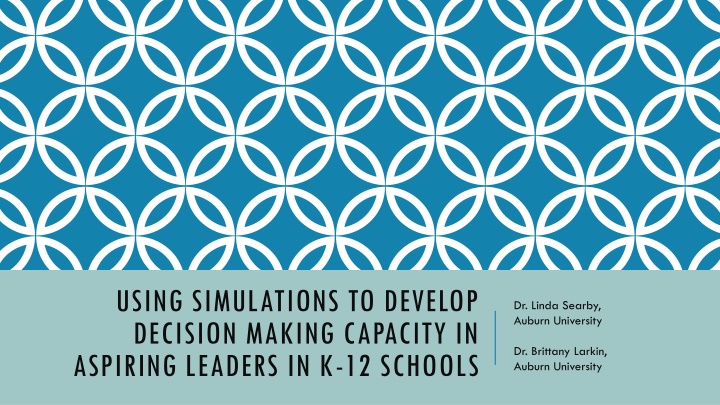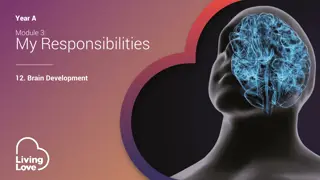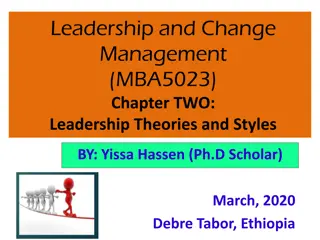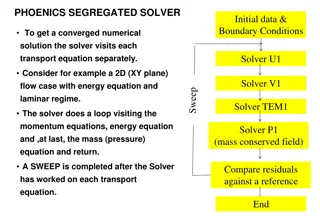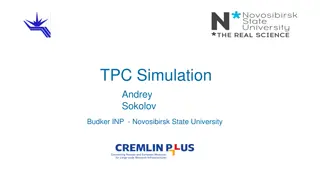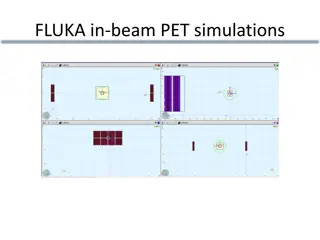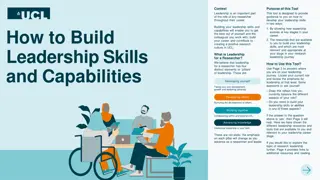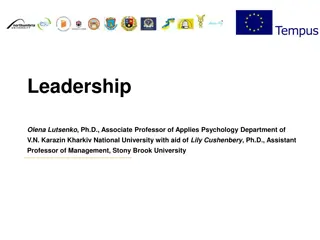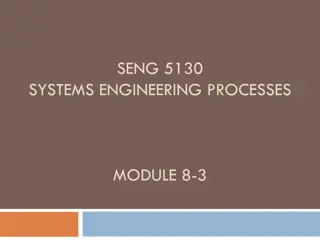Developing Decision-Making Skills Through Simulations in K-12 Leadership
This study by Dr. Linda Searby and Dr. Brittany Larkin from Auburn University focuses on using simulations to enhance decision-making abilities in aspiring school leaders. The research aims to determine the effectiveness of leadership simulations in fostering measurable growth in decision-making capacity. The methods include a mixed-methods design with a randomized control trial and qualitative evaluation of student reflections. Through literature review and research questions, the study explores the crucial role of decision-making in school administration and the potential benefits of scenario-based simulations in learning and cognitive growth.
Download Presentation

Please find below an Image/Link to download the presentation.
The content on the website is provided AS IS for your information and personal use only. It may not be sold, licensed, or shared on other websites without obtaining consent from the author.If you encounter any issues during the download, it is possible that the publisher has removed the file from their server.
You are allowed to download the files provided on this website for personal or commercial use, subject to the condition that they are used lawfully. All files are the property of their respective owners.
The content on the website is provided AS IS for your information and personal use only. It may not be sold, licensed, or shared on other websites without obtaining consent from the author.
E N D
Presentation Transcript
USING SIMULATIONS TO DEVELOP DECISION MAKING CAPACITY IN ASPIRING LEADERS IN K-12 SCHOOLS Dr. Linda Searby, Auburn University Dr. Brittany Larkin, Auburn University
NEED FOR THE STUDY Currently, we do not have a research-based indication of how aspiring school leaders decision making is developed and enhanced, specifically through the use of leadership simulations.
PURPOSE To determine if the use of authentic, problem- based leadership simulations fosters measurable growth of decision making in an aspiring school leader.
RESEARCH QUESTION: To what extent can the decision making capacity of an aspiring school leader be developed through the use of educational leadership simulations?
LITERATURE REVIEW Decision making is one of the most important tasks for school administrators (Lunenburg, 2010). The strong and courageous decision making of a school leader can result in a school turnaround from low performing to high performing. Conversely, ineffective decision making can lead to a further downward spiraling of a poor-performing school (Wallace Foundation, 2013).
LITERATURE REVIEW Scenario-based simulations can be used effectively in training and development of leaders, and can be thought of as apprenticeships in a box. The value in using simulations comes when those who experienced them retrieve insights gained from the exercise when they need it, and use it to improve their performance (Spero, 2012). The constructivist approach to learning and cognitive growth relies on exposing the learner to new experiences that create forms of mental disquiet that challenge the learner to understand and make sense of new information generated by the new experience (Powell & Kalina, 2009).
METHODS Mixed Methods Design Randomized Control Trial and Qualitative Evaluation of Student Reflections Participants: 23 students earning their Master s in Educational Leadership and an AL Principal Certification Setting: 2 cohorts of students beginning in summer of 2015 completed 9 courses plus an internship and graduated in summer 2016. Each cohort was randomly divided into a treatment or control group. All other program experiences were identical.
PROCEDURE 1. Two cohorts began the Master s Degree Program 2. Baseline Data collected using the Leadership Judgment Inventory Treatment Group N=11 Control Group N=12 3. Treatment Group completed 3 virtual simulations designed to enhance a school leader s decision making skills. Playground Mishap Disruptive Teacher Academic Goal Setting 4. Both groups completed all required coursework, passed the Praxis, graduated with M.Ed. and a Class A Principal Certification 5. Both groups completed the post assessment: Leadership Judgment Inventory
QUANTITATIVE RESULTS 1. The change in leadership style preference changed in both groups to a more balanced comfort in using all 4 leadership styles. Treatment Group Preferences Pre Post Delegative 19% Delegative 20% Directive 29% Directive 40% Consensual 17% Consensual 31% Consultative 21% Consultative 23%
QUANTITATIVE RESULTS 1. The change in leadership style preference changed in both groups to a more balanced comfort in using all 4 leadership styles. Control Group Preferences Pre Post Directive 18% Delegative 24% Directive 29% Delegative 33% Consultative 24% Consensual 41% Consultative 6% Consensual 25%
QUANTITATIVE RESULTS The percentage of change in judgment (meaning they made the same decision in a scenario as the norm referenced decision) increased in the treatment group by 19% while the control group increased by 7.8%
QUALITATIVE DATA EMERGING THEMES In answering the research question to what extent was decision-making enhanced by using simulations? participant data from open ended questions yielded the following themes: Prompted thinking before decision making Taught that every decision has a consequence Emphasized importance of fact finding & wait time in decision making Created a safe environment in which to make mistakes and see the consequences played out
IMPLICATIONS 1. The high quality Educational Leadership Master s Degree Program at Auburn University is developing the mental models of school leaders to feel confident in using all leadership styles. 2. Educational Leadership programs should increase their use of decision making simulations because having multiple opportunities to practice decision making in live acting simulations, which include consequential scenarios, enhances students abilities to use the most appropriate leadership style in a given leadership conundrum. 3. Researchers discovered the value in the live action decision making simulations which led to the creation of 2 additional live action simulations for educational leaders: School Finance Fiasco School Law: Cyber-Bullying
SCHOOL FINANCE SIMULATION Middle School Turnaround Sim http://edsimspd.com/SIMDEMO/HCMSFIN/
SCHOOL LAW SIMULATION Cyber-Bullying Sim www.humentuminc.com/ELS/CYBULL/
FOR MORE INFORMATION, TO SEE DESCRIPTIONS OF AVAILABLE SIMULATIONS, AND ASK PERMISSION TO USE THE SIMULATIONS, CONTACT: www.edsimspd.com And Dr. Ken Spero: kspero@edleadershipsims.com
